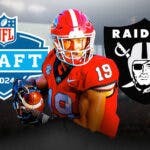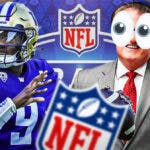After the Los Angeles Rams edged out the Minnesota Vikings 38-31 in a Thursday night thriller, it seemed as if Week 4's premier game had already taken place. However, at four o'clock eastern time on Sunday, the Cleveland Browns kicked off against the Oakland Raiders and officially claimed that title.
A back and forth battle that seemed as if it were over multiple times, the game lasted until less than two minutes remained in overtime, when the Raiders kicked a field goal to win it. It was an impressive first victory for Jon Gruden's new squad, but that has been overshadowed by the outrage at how utterly terrible the officiating was for both sides.
The overturned first down call late in the fourth quarter is getting most of the attention, but there are many more examples. In addition, Cleveland should never have allowed the officials to decide the game in the first place, and head coach Hue Jackson should be right back in the hot seat after his performance. Defensive coordinator Gregg Williams also employed some highly questionable strategies. Let's take a look at what exactly happened, and why fans are so upset.

After drops by Jarvis Landry and Rashard Higgins, Cleveland was forced to punt on their first possession of the game. Oakland went three-and-out on their first two drives, and the Browns had the ball with 10:46 remaining in the first quarter. After a two-yard gain by Carlos Hyde, Baker Mayfield dropped back and threw a pass to Antonio Callaway, who was running a curl route 12 yards down the field. Callaway slipped at his break, but was able to get both hands on the ball. However, he dropped it, and the ball tipped upward right into Gareon Conley's waiting arms. The interception was ran back for a TD, and Mayfield had thrown his first career pick-6.
On their next possession, the first bad call occurred. Mayfield lofted a beautiful pass to Duke Johnson on a wheel route for a big gain. Right after he threw the ball, Oakland's Arden Key attempted to let up on his pursuit, but ran into Mayfield anyway. He was called for roughing the passer, which angered many fans, as the hit wasn't vicious or hard. However, it appears as if Key's helmet does hit Mayfield's facemask, which is textbook roughing. The referee who threw the flag had a better angle.
#ArdenKey was flagged for roughing the passer on this play. Thoughts? #BakerMayfield #Browns #Raiders #NFL #football #CLEvsOAK pic.twitter.com/KTzct3o8M4
— Rich Eisen Show (@RichEisenShow) September 30, 2018
If the penalty was called because of the helmet-to-helmet contact, it is correct. If it was called because of the timing of the hit, it's probably the worst roughing call this season.
Despite first and goal at the one-yard line, the Browns ended the possession with only three points, a missed opportunity that would haunt them later.
After the Raiders missed a field goal on the ensuing possession, possibly the biggest stunner occurred. Browns rookie third-string RB Nick Chubb ran for a 63-yard touchdown, out-sprinting every Oakland defender, including Conley, who ran a 4.44 40-yard dash. Already with an impressive day, Chubb wasn't done, and would add to his breakout game in the second half.
After the score, Cleveland went for two, but wasn't able to convert. This aggressiveness would be a staple of their offense for the remainder of the game. Or would it?
Against a Browns defense that was arguably the best in the league through three games, Marshawn Lynch totaled 130 rushing yards on 20 carries. The only player who could consistently bring him down on first contact was Myles Garrett. Lynch was involved in the second controversial call of the game.
After the Raiders received the kickoff, Carr handed off to Lynch who ran to the left for a short gain. However, Lynch was still breaking tackles once the whistle blew and forward progress was called. He bolted down the sideline but the play was blown dead, and he showed his displeasure by punting the ball right in front of a referee, which deserved a delay of game or unsportsmanlike conduct penalty.
Many fans were mad at the officials for costing them a touchdown, but it's clear that the five Browns defenders around Lynch had let up because they heard the whistle. Lynch would almost certainly have been tackled short of the first down, let alone scored a touchdown. However, the whistle should not have been blown in the first place. This is another example of why forward progress is such a controversial rule, and that would come into play later on in the game, this time helping the Raiders in a much more crucial situation.
Beastmode went Beastmode again 😳😳😳 @MoneyLynch https://t.co/KMuO4OLIgy
— The Checkdown (@thecheckdown) September 30, 2018
Two plays later, Carr threw a pass to Jordy Nelson in an attempt to convert a third-down, but it was broken up by Terrance Mitchell. Nelson landed hard on Mitchell's right arm, which was immediately fractured. After undergoing surgery, Mitchell may end up missing the rest of the season, and his absence hurt Cleveland's defense late in the game.
On Cleveland's next possession, Mayfield threw a 49-yard touchdown to blocking tight end Darren Fells, after which Duke Johnson converted the two-point try, which gave the Browns a 10-point lead.
After Oakland received the ball, Martavis Bryant dropped a deep touchdown pass from Derek Carr, but Amari Cooper would erase his sin a few plays later, making it a three-point game.
The Raiders forced Cleveland to punt, and then made it to the Browns' 35-yard line with 30 seconds remaining in the half, but Derek Carr overthrew Jared Cook and Cleveland's E.J. Gaines made the interception, which preserved the Browns' three-point halftime lead.
After a Browns field goal, Derek Carr threw his second pick of the game, and a Jarvis Landry touchdown reception along with another Johnson two-pointer pushed Cleveland's lead to 14. At this point, it looked like the Browns were going to run away with the game. After all, they were up two scores, had one of the league's best defenses, and the Raiders had fallen apart in the second half in their first three games. Oakland's Seth Roberts dropped a pass that would've given them a first down, and all the momentum was in Cleveland's possession.
Then, on the first snap of the next drive, Mayfield double clutched on a throw and had the ball knocked out of his hand by Maurice Hurst. A Jared Cook touchdown cut the lead to a single score. Two Cleveland three-and-outs and an Oakland field goal later, the Browns' lead had dwindled to four a minute into the fourth period. On their next possession, the Browns needed to stop the bleeding, but Mayfield fumbled the snap and the Raiders recovered. A few plays later, Derek Carr rifled a touchdown to Jordy Nelson, which gave Oakland a 31-28 lead.
A David Njoku drop and a fantastic punt return by Dwayne Harris later, and the Raiders had the ball at the Browns' 29 yardline. They would add another field goal on that possession, increasing their lead to six points. 20 unanswered points by the Raider offense had Cleveland reeling. On the ensuing kickoff, Antonio Callaway fumbled and Oakland recovered, but the play was reviewed and Callaway was ruled down. The Browns narrowly dodged a bullet, and after a long reception by Callaway, Carlos Hyde ended Oakland's run with a one-yard touchdown. The Browns had reclaimed their lead, although they now lead by only one.
With 6:35 remaining, the Raiders faced a 3rd-and-9, and were saved by the officiating crew.
How is this NOT A FUMBLE for the @Browns?!? Took a TD off the board in a CLOSE game!! Awful. pic.twitter.com/JoaUfGRjwB
— Kirk Herbstreit (@KirkHerbstreit) September 30, 2018
As Carr dropped back to pass, quickly closed in, both hitting Carr at the same time. The refs blew the play dead, as Carr's forward progress had stopped. However, what the officials didn't see was that Carr had fumbled the ball immediately as he was hit, and Larry Ogunjobi was running down the sideline for a touchdown. The referee who blew the whistle ran to the pile where Carr was brought down searching for the ball to spot, but he wouldn't find it, because Ogunjobi had it, 25 yards away. The official never even saw the ball, as his view was obscured by the huddle of lineman in surrounding Carr. Yet he called the play dead anyway. Unfortunately for the Browns, this wouldn't be the last time the officiating hurt them.
After Carlos Hyde ran the ball to the 41 yard-line of Oakland, Nick Chubb got his third carry of the game, and scored a 41-yard touchdown. The Browns kicked the extra point to extend their lead to eight. Some fans wanted Cleveland to go for two once again, but taking the field goal was the correct decision. A nine-point lead may have put the game out of reach, as Oakland would have had to score twice, but taking the extra point would force the Raiders to go for two if they somehow scored again.
Oakland moved the ball all the way down to Cleveland's nine-yard line, but was unable to score. It looked as if the Browns were going to win their second consecutive game. One first down and it's over. The first play was a six-yard gain by Hyde. An excellent start; four more yards and the victory is secured.
Hyde gained two on the next carry, which brought up a crucial third-down. This time, Hyde was met in the backfield by defenders, but was able to angle his way through. The chains were brought out, and the Browns gained a first down. They had won the game.
Of course it isn't that simple. After a long review, the officials in New York determined that Hyde was short of the first down by mere inches. Apparently the crew had found conclusive evidence that Hyde was short of the line to gain. How did they determine that? The NFL has said that they stitched together multiple camera angles. Which angles were those? The NFL hasn't released that. So fans are left to look over the broadcast views to see if the call was correct or not. Here are a few shots.


The only thing conclusive here is that nothing is conclusive. In the angle shot, there's no way to tell where exactly the tip of the ball is in relation to the line to gain. In the side view, it's difficult to see when Hyde's forearm hits the grass. He is not yet down in the still. Hyde did a fantastic job of keeping his arm off the ground until the very last second, which is what gave him the first down initially.
So from those two angles, the officials determined that Hyde was short of the first down. Would Mr. Aggressive, Hue Jackson, go for the killshot and run a QB sneak to pick up the first? After all, the Browns need only a few short inches, and they have an 81% chance of picking it up. If you convert, the game is over. If you don't the Raiders get the ball on your 18-yard line still needing eight points to force overtime. Yes, they would have a shorter field, but your exhausted defense wouldn't have to cover as much ground.
According to Jackson, the thought never even crossed his mind. Okay, let's ignore the stats and give Jackson the benefit of the doubt. Oakland has zero timeouts remaining, and after a punt, would have a minute and a half to go 50 yards and score a touchdown along with an extra point. Jackson trusted his defense, which had already given up 27 points.
Cleveland forced an incompletion on third-and-1, and it looked like Jackson's decision may have just paid off. However, Briean Boddy-Calhoun was called for holding, which gave Oakland new life. A few plays later, Jared Cook caught a touchdown and Nelson caught the two-point conversion over former Raider T.J. Carrie. The Browns were playing prevent defense, so they employed plenty of soft zone, which opened up huge gaps in the secondary for Oakland receivers to find, especially behind rookie corner Denzel Ward. Ward is best in press man, and his side of the field was constantly picked on by Carr. Just as they had on offense, the Browns lost their aggressiveness late, and it cost them. The game was tied with 30 seconds remaining. The Browns still had all three timeouts, so maybe they would be able to put together a game-winning drive.
With 14 seconds left, Cleveland had the ball at Oakland's 49. Just 15 more yards and they would be in field goal range. They had one timeout remaining, and the Raiders couldn't ice kicker Greg Joseph, so things were looking good. However, Mayfield took a risk and forced the ball downfield to Callaway, where veteran free safety Reggie Nelson was waiting. Mayfield's second INT of the afternoon sent the game into overtime.
Oakland received the ball first in overtime, and was driving into Cleveland territory. A clutch sack by Jamie Collins on third-and-3 brought out the punting unit, but Gruden called a timeout and sent his kicker onto the field, who missed the 50-yard attempt.
The Browns' first play after the miss was an incomplete pass, but they once again were let down by the officials. This time, a completely legitimate roughing the passer went uncalled, right in front of the watching referee.
Mayfield was clearly hit in the helmet by Rucker, who grabbed his facemask. Yet instead of 15 yards a fresh set of downs, the Browns went three-and-out.
That drive had far too little controversy, so the refs nearly made yet another mistake.
This hit by Rodgers-Cromartie was originally called a hit on a defenseless receiver, but was correctly overturned.
After an incompletion, the Raiders got the ball back with 5:27 to play, and Cleveland's soft zone once again allowed Carr to methodically pick apart the defense. Jamie Collins had a chance at an interception, but failed to hang onto the ball. That's not the first time this season he has dropped a pick.
With 1:50 remaining, Matt McCrane kicked the ball through the uprights to give Oakland their first win of the year. It was a miraculous comeback, and they couldn't have done it without the help of the men in white and black stripes.
Cleveland can blame the officiating all they want, and rightfully so, but that doesn't eliminate the fact that the Browns blew this game. Nine total drops by the receiving corps. is unacceptable. The lack of adjustments and constant vanilla coverage in the secondary gave Oakland the chance to get back into the game. And the aggression that gave Cleveland a huge lead early on disappeared when it was needed most. The Browns are two missed field goals and a blown call from being 4-0 right now. But they're 1-2-1,and have to live with the many regrets of this game.
Meanwhile, the Raiders have to be both elated that they finally have a win and disappointed that they could barely beat the Browns.
The NFL is a crazy league, and this game may have been the craziest so far this season. No matter what the two teams take away from this match, there's no denying that the NFL has to do something about its officiating.




